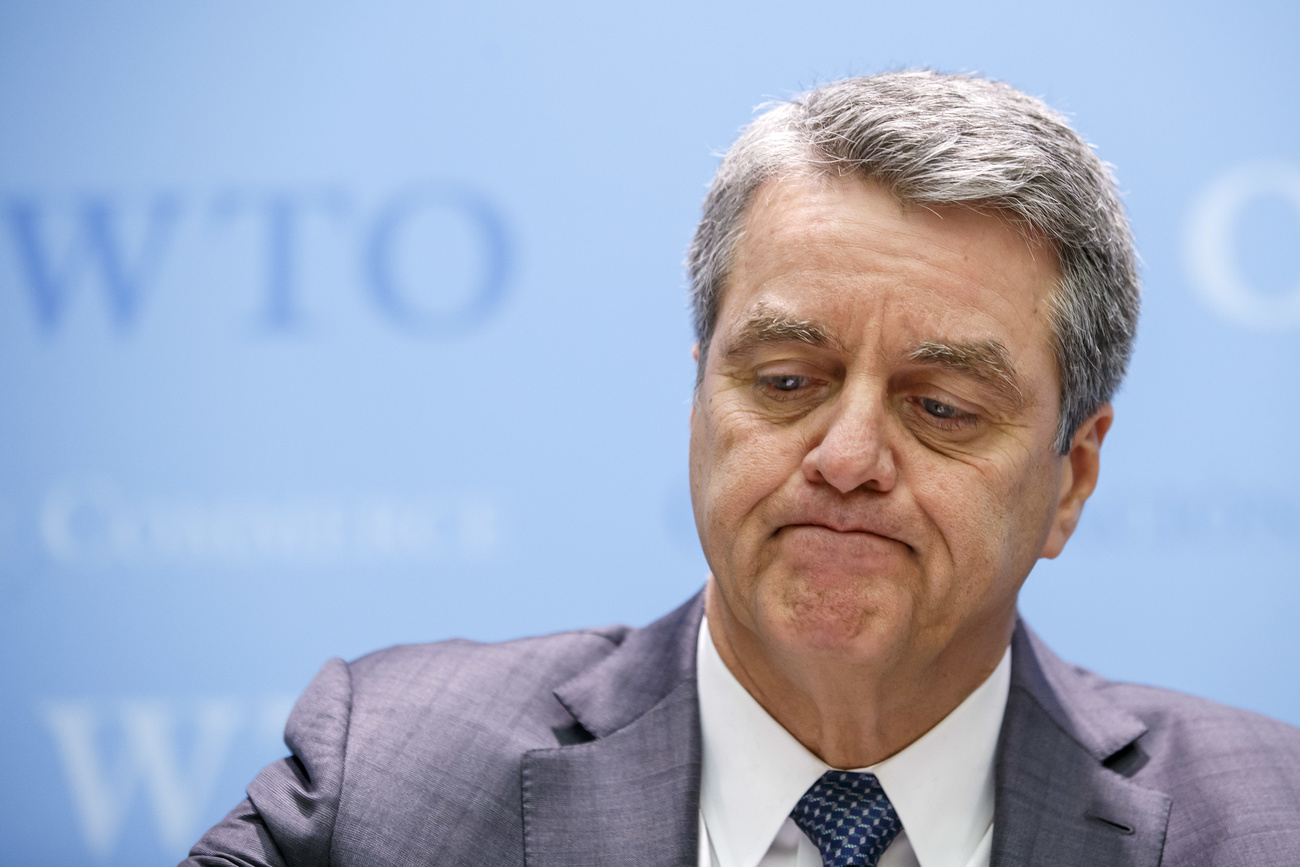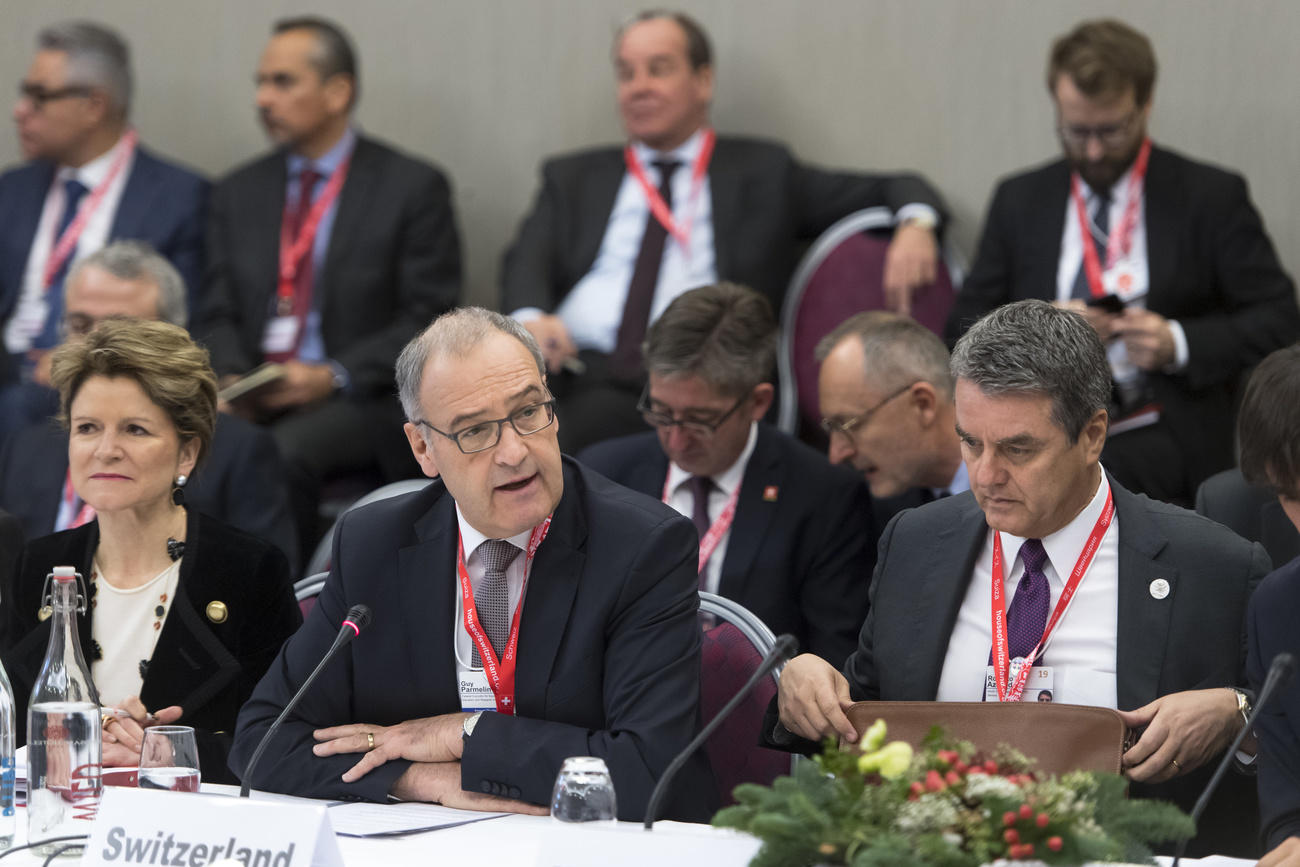The WTO’s next leader: Swiss perspectives on a global challenge

As it faces its biggest-ever crisis, the Geneva-based World Trade Organization (WTO) is also looking for a new leader. Switzerland wants to see the role filled by somebody who can build consensus and push through reforms, says Swiss ambassador to the WTO Didier Chambovey.
The list of candidates to succeed current WTO Director-General Roberto Azavedo of Brazil, who steps down at the end of August, was finalised last week.
Of the three women and five men in the running (see below), Switzerland does not yet have a favourite, according to ambassador Chambovey. Along with the 164 other member countries, it will assess the candidates as they present their positions and answer questions this week.
However, Chambovey does admit that “we need a personality with managerial skills who can carry out WTO reform, which is a tall order, and who is able to listen to member states and build a consensus”.
He told swissinfo.ch that the ideal candidate should also have “political clout”.
Eight names have emerged to succeed Roberto Azavedo. There are three women: former Nigerian finance minister Ngozi Okonjo-Iweala, former Kenyan ambassador to the WTO Amina Mohamed, and South Korea’s current trade minister Yoo Myung-hee. And five men: former WTO deputy director-general Jesús Seade Kuri of Mexico, former WTO negotiator Abdel-Hamid Mamdouh of Egypt, former Moldovan foreign Minister Tudor Ulianovschi, Saudi Arabian former economy minister Mohammad Maziad Al-Tuwaijri, and British MP Liam Fox, who was trade minister under Boris Johnson until 2019.
Restoring trust
After the candidates present themselves (July 15-17), there will be a campaign phase and consultations among member states aimed at forming a consensus around one candidate. An interim leadership is possible and indeed seems likely, since the end of the “campaign phase” has now been set for September 7.
How important is the leadership process? “On the one hand, the director-general doesn’t have that much power,” says international trade law expert Joost Pauwelyn of Geneva’s Graduate Institute of International and Development Studies.
“At the same time everyone is eager to find out if consensus can be found on anything these days,” he says. “This could be something new, a first step to rebuilding trust.”

More
Inside Geneva: World trade at a crossroads
Disputes and reform
The WTO faces not only criticism and calls for reform. The US under Donald Trump has also virtually paralysed its key dispute settlement body by blocking new judges’ appointments to the appeals panel. The US is unhappy with the court’s “overreach” and “disregard” of WTO rules; it is also irked about how the WTO has tied its hands in dealing with China. At present, only one judge remains operational on the original seven-member appeals court that rules on trade disputes. A minimum of three are needed for it to function.
Some WTO members, including the European Union and China, have set up an interim trade dispute mechanism. Switzerland has also joined – but unlike others in the group it has hardly any dispute cases that need settling. Pauwelyn sees this as a sign of Switzerland’s commitment to multilateralism.
“Switzerland has a lot to gain from a strong WTO,” he says. It also has an interest in keeping the body in Geneva. “For Switzerland that’s a top priority. The Graduate Institute has just launched the Geneva Trade Platform with seed money from the Swiss government. One reason is to highlight Geneva’s importance for international trade.”
‘Key for Switzerland’
Chambovey says the current US position is not the only challenge for the WTO.
Switzerland’s reform priorities include updating the WTO rulebook “to take account of new technologies including e-commerce”, tackling subsidies that lead to overfishing and depletion of global resources, and finding “a way to re-establish a fully-functioning dispute body”, Chambovey says. He adds that there needs to be a new approach to special treatment for developing countries, “which should not all benefit from the same flexibilities and should be granted differentiated treatment according to their level of development”.
He also stresses that a properly functioning WTO is crucial for Switzerland, a small country with a relatively oversized, globalized economy that depends a lot on international trade.
“It’s extremely important for us that this body is functioning well and that we can preserve an open trading system,” he told swissinfo.ch. “It’s important for our economy.”

In compliance with the JTI standards
More: SWI swissinfo.ch certified by the Journalism Trust Initiative













You can find an overview of ongoing debates with our journalists here . Please join us!
If you want to start a conversation about a topic raised in this article or want to report factual errors, email us at english@swissinfo.ch.